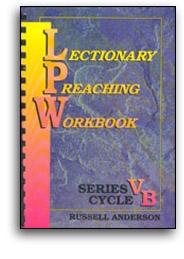SermonStudio
God's good news
Preaching
Lectionary Preaching Workbook
Series V, Cycle B
Theme For The Day: God's good news. God shows his graciousness through the covenant he established through Noah. God would never again destroy the world through flood. In the Gospel Jesus announces the kingdom of God. All we have to do is repent and believe the good news.
BRIEF COMMENTARY ON THE LESSONS
Lesson 1: Genesis 9:8--17 (C, E); Genesis 9:8--15 (RC)
BRIEF COMMENTARY ON THE LESSONS
Lesson 1: Genesis 9:8--17 (C, E); Genesis 9:8--15 (RC)


